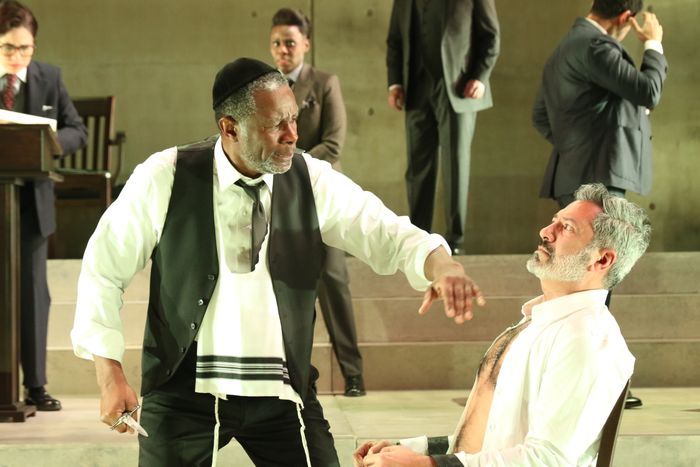
The merchant in The Merchant of Venice has it tough. He cares about a jerk who keeps borrowing money. He’s lost more argosies than you’ve had hot dinners. And worst of all — no one remembers that he is not Shylock. The actual merchant in Shakespeare’s play is the melancholy Antonio, who survives Shylock’s plot to extract a pound of flesh for a loan gone bad. Yet our loyalties have slewed around so completely in the last 400 years that we now think the play (even its title!) belongs to the man who is, dramaturgically speaking, merely the villain.
Admittedly, the non-Shylock parts of Merchant are hardly Shakespeare’s best. Antonio’s friend Bassanio and the wealthy Portia are stuck in a by-the-numbers comic romance plot in which Portia’s suitors need to choose among three metal chests. It’s all a bit silly. But then Bassanio’s friend Lorenzo elopes with Shylock’s daughter, Jessica, and the moneylender, after a lifetime of insults, breaks bad. The play’s pale body flushes with blood. “Hath not a Jew eyes?” Shylock asks when someone begs him to stop gunning for Antonio. “If you wrong us, shall we not revenge?” That speech — one of the treasures hidden in the play’s lead casket — saves the play, time and again, from history’s total censure.
The modern-dress production now at Brooklyn’s Theater for a New Audience certainly contains up-to-the-minute disapproval for all the ways that Shakespeare fails us. To correct for its wrong-thinking, director Arin Arbus’s staging arranges itself as a pedestal for John Douglas Thompson’s superb Shylock, a choice that winds up hurting the other parts of the show. The Merchant of Venice is, yes, unbalanced, but instead of correcting for this unsteadiness, Arbus leans into it. Shylock is the play’s best character. But this production treats Shylock as its tragic hero, changing pace, emphasis, and attitude to convert the script from one genre to another. The comedy evaporates — though the “comic” scenes, now slowed and painful, remain. Every time Shylock is offstage, the production’s clockwork winds down; every time he enters, he has to crank the machinery up again.
But no lightness could thrive in this environment anyway. Riccardo Hernandez’s severe unit set is monumental — a set of wide gray stairs, rising to a tall concrete wall, pierced by an oculus. (This black hole sometimes functions as a dark moon, sometimes as a window.) It looks like a slab of Rome’s EUR district, or a Brutalist building’s side entrance. Private events happen in this impersonal space, and public stuff, too, with people standing awkwardly on higher and lower steps, shouting across the distance. Every time it feels like we’re in the wrong place for something to be happening: When Lorenzo (David Lee Huynh) and Jessica (Danaya Esperanza) canoodle there barefoot, you think, Ick, that plaza isn’t clean. When the courtroom scene begins, you wonder, Why are they in the lobby? Hernandez’s point is that state architecture is hostile and anti-human. But when it comes to the actual playing of scenes … well. Arbus arranges conversational groups as if she’s still adhering to a six-foot social-distancing rule.
Something else gums up the rest of the works — is it revulsion? If anyone is creepy, Arbus shines a light on the creeping so we can all disapprove together. (Of course, everyone is creepy.) She has costume designer Emily Rebholz dress Antonio’s sleazoid friend Gratiano (Haynes Thigpen) in a pink shirt and prep-school tie, which makes him seem particularly son-of-Trumpian. Portia (Isabel Arraiza) complains that she doesn’t want to marry the Prince of Morocco (Maurice Jones) because of his “complexion,” and her Black assistant Nerissa (Shirine Babb) registers the slur and gives her the stink-eye. Choices like these, though, make subsequent scenes difficult to play. Why isn’t this obscene version of Gratiano cold-shouldered by any of his friends? And this Nerissa would definitely ditch her racist boss. Here Antonio (Alfredo Narciso) loves Bassanio (Sanjit De Silva) in a way that is breaking both their hearts, but again, there’s no reason for such modern men to deny themselves their passion. The production spotlights existing character flaws and, by making them contemporary, creates new ones. They become a pack of cowards, bigots, and failsons.
So into this nest of snakes comes Shylock. The bluff, genial Thompson tends to reel when he walks, like a cowboy who’s just gotten off his horse. He radiates good nature — his many fine classical performances have included right-hand-men like Kent (in King Lear) and Enobarbus (in Antony and Cleopatra). You see a glimpse of that warm, reliable Thompson when he reaches out to shake Antonio’s hand. This warmth makes it doubly awful when he is rebuffed. Thompson deflates and shrinks back, folding himself up, trying to disappear even at center stage. This disappearing-in-plain-sight even extends to the way he speaks: Over the years, Thompson’s beautiful sawmill rasp has been abraded almost to a whisper. As Shylock, he storms, he weeps, he staggers, he rages … and every time, you hear the effort it takes for his voice to recover. The centuries have been hard on Shakespeare’s play; time has blown the sand away to show us the armature underneath. Thompson’s exhausted performance shows us all of that: the centuries, the sand, the skeleton. He cannot carry the whole evening on his back. No man could. He comes close, though, by shouting his Shylock into the wind, by playing him, his voice scratched raw, as if he’s been playing him forever.
The Merchant of Venice is at Theater for a New Audience through March 6.


